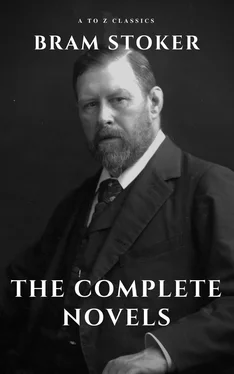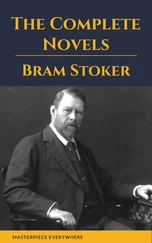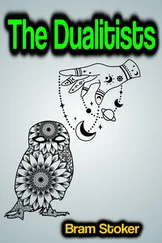A to Z Classics - Bram Stoker - The Complete Novels
Здесь есть возможность читать онлайн «A to Z Classics - Bram Stoker - The Complete Novels» — ознакомительный отрывок электронной книги совершенно бесплатно, а после прочтения отрывка купить полную версию. В некоторых случаях можно слушать аудио, скачать через торрент в формате fb2 и присутствует краткое содержание. Жанр: unrecognised, на английском языке. Описание произведения, (предисловие) а так же отзывы посетителей доступны на портале библиотеки ЛибКат.
- Название:Bram Stoker: The Complete Novels
- Автор:
- Жанр:
- Год:неизвестен
- ISBN:нет данных
- Рейтинг книги:4 / 5. Голосов: 1
-
Избранное:Добавить в избранное
- Отзывы:
-
Ваша оценка:
- 80
- 1
- 2
- 3
- 4
- 5
Bram Stoker: The Complete Novels: краткое содержание, описание и аннотация
Предлагаем к чтению аннотацию, описание, краткое содержание или предисловие (зависит от того, что написал сам автор книги «Bram Stoker: The Complete Novels»). Если вы не нашли необходимую информацию о книге — напишите в комментариях, мы постараемся отыскать её.
The Complete Novels :
The Primrose Path
The Snake's Pass
The Watter's Mou'
The Shoulder of Shasta
Dracula
Miss Betty
The Mystery of the Sea
The Jewel of Seven Stars
The Man
Lady Athlyne
The Lady of the Shroud
The Lair of the White Worm
Bram Stoker: The Complete Novels — читать онлайн ознакомительный отрывок
Ниже представлен текст книги, разбитый по страницам. Система сохранения места последней прочитанной страницы, позволяет с удобством читать онлайн бесплатно книгу «Bram Stoker: The Complete Novels», без необходимости каждый раз заново искать на чём Вы остановились. Поставьте закладку, и сможете в любой момент перейти на страницу, на которой закончили чтение.
Интервал:
Закладка:
My satisfaction at so bravely adhering to my resolution, in spite of so much mental torment and temptation, may be imagined when, at the expiration of the appointed time, on ascending to the hill-top, I saw my beautiful friend sitting on the edge of the plateau and heard her first remark after our mutual salutations:
“I have been here nearly two hours, and am just going home! I have been wondering and wondering what on earth you were working at all over the hill-side! May I ask, are you a botanist?”
“No!”
“Or a geologist?”
“No!”
“Or a naturalist?”
“No!”
There she stopped; this simple interrogation as to the pursuits of a stranger evidently struck her as unmaidenly, for she blushed and turned away.
I did not know what to say; but youth has its own wisdom — which is sincerity — and I blurted out:
“In reality I was doing nothing; I was only trying to pass the time.”
There was a query in the glance of the glorious blue-black eyes and in the lifting of the ebon lashes; and I went on, conscious as I proceeded that the ground before me was marked “Dangerous”:
“The fact is, I did not want to come up here till after three, and the time seemed precious long, I can tell you.”
“Indeed. But you have missed the best part of the view. Between one and two o’clock, when the sun strikes in between the islands — Cusheen there to the right, and Mishear — the view is the finest of the whole day.”
“Oh, yes,” I answered, “I know now what I have missed.”
Perhaps my voice betrayed me. I certainly felt full of bitter regret; but there was no possibility of mistaking the smile which rose to her eyes and faded into the blush that followed the reception of the thought.
There are some things which a woman cannot misunderstand or fail to understand; and surely my regret and its cause were within the category.
It thrilled through me with a sweet intoxication, to realise that she was not displeased. Man is predatory even in his affections, and there is some conscious power to him which follows the conviction that the danger of him — which is his intention — is recognised.
However, I thought it best to be prudent, and to rest on success — for a while, at least. I therefore commenced to talk of London, whose wonders were but fresh to myself, and was rewarded by the bright smile that had now become incorporated with my dreams by day and by night.
And so we talked — talked in simple companionship; and the time fled by on golden wings. No word of love was spoken or even hinted at, but with joy and gratitude unspeakable I began to realise that we were en rapport. And, more than this, I realised that the beautiful peasant girl had great gifts — a heart of gold, a sweet, pure nature, and a rare intelligence. I gathered that she had had some education, though not an extensive one, and that she had followed up at home such subjects as she had learned in school. But this was all I gathered. I was still as ignorant as ever of her name, and all else beside, as when I had first heard her sweet voice on the hill-top.
Perhaps I might have learned more had there been time; but the limit of my knowledge had been fixed. The time had fled so quickly, because so happily, that neither of us had taken account of it; and suddenly, as a long red ray struck over the hill-top from the sun, now preparing for his plunge into the western wave, she jumped to her feet with a startled cry:
“The sunset! What am I thinking of! Good-night! goodnight! No, you must not come — it would never do! Goodnight!” And before I could say a word, she was speeding down the eastern slope of the mountain.
The revulsion from such a dream of happiness made me for the moment ungrateful; and I felt that it was with an angry sneer on my lip that I muttered, as I looked at her retreating form:
“Why are the happy hours so short, while misery and anxiety spread out endlessly?”
But as the red light of the sunset smote my face, a better and a holier feeling came to me; and there on the top of the hill I knelt and prayed, with a directness and fervor that are the spiritual gifts of youth, that every blessing might light on her — the arrière pensée being — her, my wife. Slowly I went down the mountain after the sun had set; and when I got to the foot I stood bareheaded for a long time, looking at the summit which had given me so much happiness.
Do not sneer or make light of such moments, ye whose lives are gray. Would to God that the gray haired and gray-souled watchers of life, could feel such moments once again!
I walked home with rare briskness, but did not feel tired at all by it; I seemed to tread on air. As I drew near the hotel I had some vague idea of hurrying at once to my own room, and avoiding dinner altogether as something too gross and carnal for my present exalted condition; but a moment’s reflection was sufficient to reject any such folly. I therefore achieved the other extreme, and made Mrs. Keating’s kindly face beam by the vehemence with which I demanded food. I found that Dick had not yet returned — a fact which did not displease me, as it insured me a temporary exemption from Andy’s ill-timed banter, which I did not feel in a humor to enjoy at present.
I was just sitting down to my dinner when Dick arrived. He, too, had a keen appetite; and it was not until we had finished our fish, and were well into our roast duck, that conversation began. Once he was started, Dick was full of matters to tell me. He had seen Moriarty — that was what had kept him so late — and had got his permission to investigate and experiment on the bog. He had thought out the whole method of work to be pursued, and had, during Murdock’s dinner-time, made to scale a rough diagram for me to work by. We had our cigars lit before he had exhausted himself on this subject. He had asked me a few casual questions about my walk, and, so as not to arouse any suspicions, I had answered him vaguely that I had had a lovely day, had enjoyed myself immensely, and had seen some very pretty things — all of which was literally and exactly true. I had then asked him as to how he had got on with his operations in connection with the bog. It amused me to think how small and secondary a place Shleenanaher, and all belonging to it, now had in my thoughts. He told me that they had covered a large portion of the new section of the bog; that there was very little left to do now, in so far as the bog was concerned; and he descanted on the richness and the fine position of Murdock’s new farm.
“It makes me angry,” said he, “to think that that human-shaped wolf should get hold of such a lovely spot, and oust such a good fellow as the man whom he has robbed — yes, it is robbery, and nothing short of it. I feel something like a criminal myself for working for such a wretch at all.”
“Never mind, old chap,” said I; “you can’t help it. Whatever he may have done wrong, you have had neither act nor part in it. It will all come right in time.” In my present state of mind I could not imagine that there was, or could be, anything in the world that would not come all right in time.
We strolled into the street, and met Andy, who immediately hurried up to me:
“Good-evenin’, yer ‘an’r! An’ did ye give me insthructions to me father?”
“I did, Andy; and he asked me to tell you that all shall be done exactly as you wish.”
“Thank yer ‘an’r.”
He turned away, and my heart rejoiced, for I thought I would be free from his badinage; but he turned and came back, and asked, with a servility which I felt to be hypocritical and assumed:
“Any luck, yer ‘an’r, wid bogs to-day?”
I know I got red as I answered him:
“Oh, I don’t know — yes, a little — not much.”
Читать дальшеИнтервал:
Закладка:
Похожие книги на «Bram Stoker: The Complete Novels»
Представляем Вашему вниманию похожие книги на «Bram Stoker: The Complete Novels» списком для выбора. Мы отобрали схожую по названию и смыслу литературу в надежде предоставить читателям больше вариантов отыскать новые, интересные, ещё непрочитанные произведения.
Обсуждение, отзывы о книге «Bram Stoker: The Complete Novels» и просто собственные мнения читателей. Оставьте ваши комментарии, напишите, что Вы думаете о произведении, его смысле или главных героях. Укажите что конкретно понравилось, а что нет, и почему Вы так считаете.












